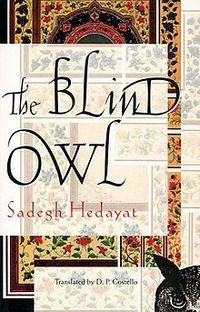The Blind Owl: Difference between revisions
No edit summary |
No edit summary |
||
| (3 intermediate revisions by the same user not shown) | |||
| Line 8: | Line 8: | ||
---- | ---- | ||
[[File:Blind_Owl.jpg|right|200px]] | |||
'''Artist:''' Sadegh Hedayat | '''Artist:''' Sadegh Hedayat | ||
| Line 19: | Line 20: | ||
'''Description of Artwork:''' The Blind Owl tells the story of an artist's obsession over the fear of death. The story would have been deemed acceptable for publication in Iran had certain passages on atheism been deleted. | '''Description of Artwork:''' The Blind Owl tells the story of an artist's obsession over the fear of death. The story would have been deemed acceptable for publication in Iran had certain passages on atheism been deleted. | ||
'''The Incident:''' During the 1930's, Iranian clergymen did not hold official political power, but their opinions were highly regarded and carried political weight. In 1936, when Hedayat tried to publish the novel, he was told it could be done only if he removed certain atheist passages. He refused and went to India where the book was published and sent to other countries. | '''The Incident:''' During the 1930's, Iranian clergymen did not hold official political power, but their opinions were highly regarded and carried political weight. In 1936, when Hedayat tried to publish the novel, he was told it could be done only if he removed certain atheist passages. He refused and went to India where the book was published and sent to other countries. | ||
After Hedayat's death, the book was banned again. In 1979, with the establishment of the Islamic Republic, the work was considered anti-religious and the publisher was put on trial. | |||
After | '''Results of Incident:''' After being banned in 1936, Iran's new shah, Mohammed Reza Pahlavi, in 1941, removed all censorship restrictions and the book was brought to Iran, where it became a best seller. | ||
The 1979 ban remained until 1993 when it was allowed to be published if heavily censored. These edits were worse than the ones originally proposed, as they cut not only religious passages, but anything remotely sexual as well. | |||
'''Source:''' Censorship: A World Encyclopedia. Ed. Derek Jones. Chicago; London: Fitzroy Dearborn, 2001. | '''Source:''' Censorship: A World Encyclopedia. Ed. Derek Jones. Chicago; London: Fitzroy Dearborn, 2001. | ||
| Line 43: | Line 45: | ||
{{DISPLAYTITLE:<span style="font-style: italic;">The Blind Owl</span>}} | {{DISPLAYTITLE:<span style="font-style: italic;">The Blind Owl</span>}} | ||
{{DEFAULTSORT:Blind Owl, The}} | |||
Latest revision as of 16:38, 1 August 2011
Date: 1936, 1979
Region: The Middle East
Subject: Religion
Medium: Literature
Artist: Sadegh Hedayat
Confronting Bodies: Iranian clergymen and, later, the Islamic Republic
Dates of Action: 1936 and 1979
Location: Iran
Description of Artwork: The Blind Owl tells the story of an artist's obsession over the fear of death. The story would have been deemed acceptable for publication in Iran had certain passages on atheism been deleted.
The Incident: During the 1930's, Iranian clergymen did not hold official political power, but their opinions were highly regarded and carried political weight. In 1936, when Hedayat tried to publish the novel, he was told it could be done only if he removed certain atheist passages. He refused and went to India where the book was published and sent to other countries.
After Hedayat's death, the book was banned again. In 1979, with the establishment of the Islamic Republic, the work was considered anti-religious and the publisher was put on trial.
Results of Incident: After being banned in 1936, Iran's new shah, Mohammed Reza Pahlavi, in 1941, removed all censorship restrictions and the book was brought to Iran, where it became a best seller.
The 1979 ban remained until 1993 when it was allowed to be published if heavily censored. These edits were worse than the ones originally proposed, as they cut not only religious passages, but anything remotely sexual as well.
Source: Censorship: A World Encyclopedia. Ed. Derek Jones. Chicago; London: Fitzroy Dearborn, 2001.
